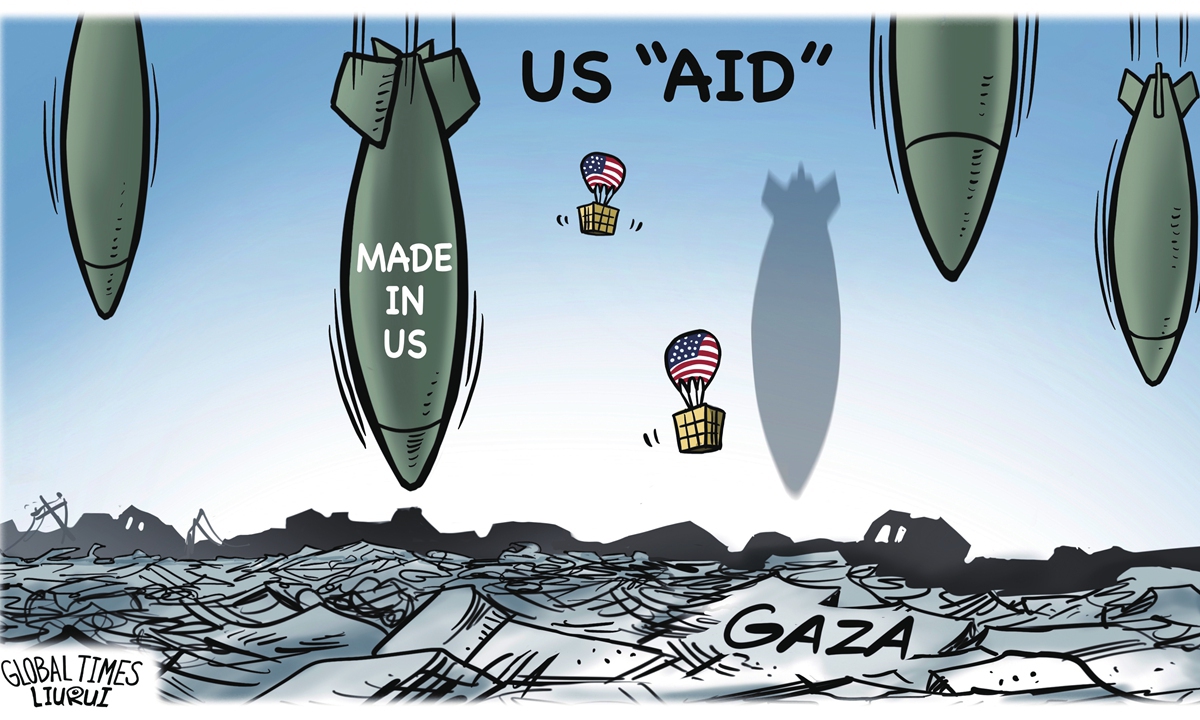
Illustration: Liu Rui/GT
In less than four months since the announcement of its creation, the US-built temporary pier in Gaza to bring humanitarian aid to the region may be facing the end of its life. Now, it seems that this project, which cost $230 million, is a failed attempt by the US to show it cares about the humanitarian disasters in Gaza, but in fact, lacks sufficient sincerity.
On Friday, local time, the Pentagon said this floating pier was being removed due to weather. The United Nations said Saturday that work had begun to transport tons of aid piled up at the pier.
Meanwhile, as humanitarian aid groups stopped distributing supplies due to security concerns earlier this month, US officials confirmed the pier may not be reinstalled unless aid agencies reach an agreement to begin distributing the aid again. In other words, as UK media outlet The Independent put it, the pier "may never come back."
Since the outbreak of this round of the Israel-Palestine conflict, alleviating the humanitarian crises in Gaza has been a challenge for the international community. Meanwhile, it is not difficult to see how much Washington wants to do some "good deeds" to prove that it still cares about the Palestinian people.
On March 7, US President Joe Biden announced plan to build a temporary pier in Gaza in his State of the Union address. Niu Xinchun, executive director of the China-Arab Research Institute of Ningxia University, told the Global Times that the project was launched in a hurry - back then, Gaza was facing serious humanitarian crises while the US was under intense pressure over this matter.
As a result, the Biden administration instructed the US military to build the pier in an "emergency mission," without taking into account factors such as the weather and the situation in the Gaza Strip or working on the feasibility of this project, said Niu.
Officially put into operation in May, the pier was torn apart by high winds and heavy seas just over a week later. As reported by The New York Times, the entire project has only completed 10 full days of operations by mid-June, not to mention the negligible amount of aid the US has provided to Gaza through the sea route. The pier, eventually, ended up becoming an "irresponsible and expensive experiment" and a "sideshow."
Experts said there should be no technical difficulties in building a relatively solid pier in the Eastern Mediterranean. However, it is ridiculous that the US still managed to build a jerry-built, useless project with $230 million. The possibility cannot be ruled out that this is connected with corruption in the US military, one scholar told the Global Times.
As it stands now, this pier is a failed project of political grandstanding. How much can the US expect it to contribute to easing the humanitarian disasters when it can't even build a pier in Gaza that can operate stably for a rather long period? The failure of this project not only undermines Washington's reputation and honesty on Gaza humanitarian issues, but also casts doubt on its capabilities.
At the current stage, to effectively solve the humanitarian disasters in Gaza, the most fundamental measure is to urge both sides in war to cease fire immediately. However, this pier drama clearly shows that the US government is unwilling to confront Israel over its obstruction of the delivery of relief supplies, or to use its influence over Israel to mitigate the devastating consequences of the war.
On the contrary, it is difficult for Washington to get rid of its favor of Israel on the Gaza issue under the influence of many pro-Israel politicians at home. One of the latest examples is that a day before the pier was announced to be removed, the US House of Representatives passed an amendment that would ban the State Department from citing Gaza Health Ministry death toll statistics.
Israel has long been skeptical of the death toll coming from the Gaza agency, accusing it of "inflating the figure for political reasons." The House amendment is a call by some US politicians for Washington to help Israel in a public opinion warfare. However, such a move is as self-deceiving as burying one's head in the sand. It is foolish for these politicians to believe the world will not know what kind of humanitarian disasters are happening in Gaza without citing those figures.
Right now, the amendment is on its way to the Senate for consideration, meaning it is still far from becoming a thing. Yet, the tendency behind it, just like the pier drama, is dangerous enough - the US is embarking on a path farther and farther away from taking the humanitarian crises in Gaza seriously. In that case, the humanitarian aid pier in Gaza perhaps will really never make a comeback.




